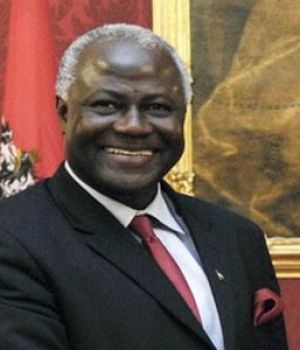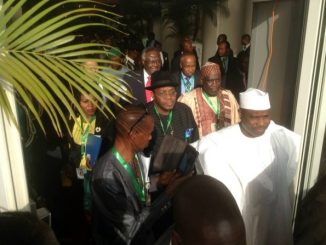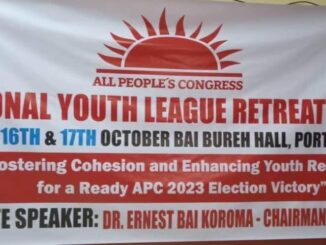
Sierra Leone’s President, His Excellency Dr. Ernest Bai Koroma, arrived today in Paris, France to attend the Summit on Peace and Security in Africa.
PRESIDENT ERNEST BAI KOROMA
READ IN FULL WHAT THE SUMMIT IS ABOUT :
Nearly 40 African leaders – including longstanding strongmen and newly elected presidents – are meeting in Paris on Friday for a summit focused on peace and security in Africa as France prepares to launch its second military intervention in the continent this year.
French President François Hollande is hosting the two-day Africa-France peace and security summit a day after the UN Security Council adopted a resolution authorising French and African troops in the Central African Republic (CAR) to use force to protect civilians.
The UN resolution followed warnings by French officials that the landlocked African nation was at risk of spiralling into genocide after CAR’s interim President Michel Djotodia – a rebel leader who seized power in March – failed to control his fighters.
France, which already has around 400 troops based in the CAR capital of Bangui, is set to increase its force in the former French colony to at least 1,000 soldiers. An African Union force of 2,500 will be boosted to 3,600.
France’s CAR intervention comes at the end of an eventful year that began with a major French military operation in Mali to liberate large swathes of the West African nation from jihadist control.
Playing gendarme
The interventions in the two former French colonies have raised questions over whether France is slipping back to an interventionist past when Paris played gendarme in its “pré carré” (backyard) – as its sub-Saharan zone of influence was popularly known.
African leaders on Friday are gathering for the summit at the Elysée presidential palace, a sumptuous building where former presidents and their advisors once plotted the fates of leaders in France’s African pré carré.
The bad old days of Françafrique – as France’s opaque dealings in its former African colonies are known – may be over.
|
A day before the summit, CAR Prime Minister Nicolas Tiangaye – who is representing his country at the Elysée meeting – pleaded for a French intervention in an interview with the AFP.
The call for a French intervention was reminiscent of similar pleas at the height of the Françafrique era.
Legend has it that Jacques Foccart – the secretive former mastermind of French interests in Africa, who died in 1997 – kept several pre-prepared letters requesting military assistance in his office at Elysée palace.
The letters, it is said, were already signed by African presidents requesting a French intervention. Apparently Foccart simply had to add a date on these documents.
Highlighting African solutions to African problems
But Paul Melly, a specialist on Franco-African relations at UK think-tank Chatham House, cautions against drawing facile comparisons with the past.
“Africa has changed, and so has France,” said Melly, noting Hollande has been at pains to secure international, and particularly African, backing for recent military interventions. “Everyone can see where Hollande is coming from – he has made a big point about communicating with other African partners.”
One of the stated themes of the Elysée Summit for Peace and Security is the need to formulate “a holistic approach” by “Africans, with the support of their partners, to tackle the security and economic factors that cause crises, conflicts and instability and in order to enhance prevention policies”.
The focus on “African solutions for African problems” underscores the need for a framework that would enable a rapid response to address the continent’s crises, according to Patrick Smith, editor of the respected monthly, The Africa Report.
“Both France and the African Union want a long-term solution and not just putting a sticking plaster over a problem,” said Smith. “We need political initiatives, which will have to come from the African Union.”
The lessons of Mali
Over the past few years, AU member states have proved to be willing and able to deploy troops in peace operations across the continent. But African troops lack the ability to respond rapidly, as the decisive French intervention in Mali underscored.
|
|
“We’ve just gone through a period of a huge intervention in Mali, which had to be organised piece-by-piece,” said Melly. “One of the big lessons after Mali was that Africa has a willingness to intervene, it has a long history of intervention. But it hasn’t always had the ability to design and plan. It’s not just a question of money – everyone knows that these interventions require international financial assistance. It’s a matter of strategic planning and organising logistics.”
More than a decade after its conceptualisation, a planned African Standby Force (ASF) has still not got off the ground. Embarrassed by the French intervention in Mali, the AU has now proposed a temporary mechanism, the African Capacity for Immediate Response to Crises (ACIRC).
But unless the systemic problems of a lack of financial resources, gaps in military capabilities and a unified political leadership are addressed, the ACIRC is unlikely to manage the much-touted African solution to African problems.
Where leaders meet to plot and plan
While the CAR and Mali interventions are set to dominate the two-day meeting, experts believe other crises – such as the situation in the Democratic Republic of Congo – are likely to be discussed at working sessions on the sidelines of the summit.
Invariably, when substantial numbers of heads of state gather at a forum, attention is often diverted to the sidelines of the summit, where old acquaintances and rivals find themselves rubbing shoulders – or avoiding each other.
“The important thing is this provides an outside forum for African governments already at the summit to meet and to break up into smaller groups to plot and plan,” said Smith.
Weeks after the Congolese military – backed by strong UN support – succeeded in defeating the M23 rebels in the eastern part of the country, Congolese President Joseph Kabila is attending the 2013 Elysée Summit for Peace and Security.
His regional foe, Rwandan President Paul Kagame though is not attending the summit.
“It would have been embarrassing for Kagame. His government has been accused of backing the M23,” explained Smith. “Kabila of course is coming to Paris. He’s on something of a victory tour after Congolese forces backed by the UN defeated the M23 and succeeded in pushing them to join security talks in [the Ugandan capital of] Kampala.”
Boosting French economic ties with Africa
The 2013 Elysée summit is also aimed at boosting France’s economic links with Africa at a time when Paris has been losing ground to emerging powers such China, India and Turkey.
At a mini economic summit earlier this week, Hollande called on French businesses to “double” their trade with Africa following a steady decline in France’s market share from 7.73% of exports and 9.08% of imports in 1960, to 2.8% and 2.05% respectively in 2011.
But the continent’s largest economic drivers are English-speaking – or Anglophone – countries, where France has yet to make substantial economic inroads.
If France aims to increase its economic presence in Africa, Smith notes that the important question is how Paris plans to achieve it.
“Will France revert to the old sordid business of economic and political deals or will it offer more dynamic partnerships?” asked Smith. “France will be trying to push a modernising, more imaginative vision for the future – at least that’s how the French will spin it.”






Leave a Reply